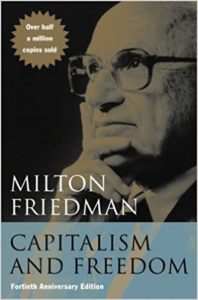Since Milton Friedman’s passing in 2006, his legacy has drawn considerable fire for all the usual reasons of political expediency and ideology. Both have come into play recently with special force over his ideas in the area of school choice. In the highly polarized politics of the present, it was perhaps to be expected that the charge of racism would be added to the list of particulars.
On August 16, Jon Hale – a professor of education history at the University of Illinois – wrote what appears to be just such a piece in the Chicago Tribune with the assertion that the history of school choice was “grounded in racism from the start,” and is “deeply connected to racial segregation.”[1]
The situating of ideas with particular persons and their motives in time and place has a role in historical understanding. It is part of establishing context. In doing so, however, the historian has an obligation to understand an individual thinker in his or her own terms, giving a fair and full treatment of the views in question.
What sets political propaganda apart from an authentic historical account is the degree to which the narrative abjures such an understanding of content and attempts to draw conclusions solely on the basis of the alleged opinions and motives of others. Known to philosophers and lawyers as the “association fallacy,” or “guilt by association,” juries and students alike are liable to be taken unawares if they are not paying close attention.
For the real historian, the test of any narrative is to be found in how the content of thoughts and motives is handled. In the case of a scholar like Friedman, any serious account of his policy proposals must begin with an understanding of basic economic principles and an appreciation for the working out of market processes through time.
Most especially, historians who treat with economics must plumb deeper than mere surface impressions. They need to have an awareness of the unintended consequences that follow from innumerable intentional acts. Mr. Hale evinces none of this in his short piece. He speaks of families “choosing the best schools” and the “reign of market forces,” but never tries to clarify what these might mean or how choice and market forces might work in time. And that is too bad, because Friedman made it abundantly clear what he was arguing for. A proper representation of his arguments by Hale would have required hardly more than one or two additional paragraphs.
Friedman’s argument had nothing whatever to do with the particular aims of particular persons, but with the processes that arise from the freedom of individuals to choose, whatever their particular reasons might be. “The preserves of discrimination in any society,” Friedman took pains to show, “are the areas that are most monopolistic in character, whereas discrimination against groups of particular color or religion is least in those areas where there is the greatest freedom of competition.”

And he went on to illustrate how that process actually works: “A businessman or an entrepreneur who expresses preferences in his business activities that are not related to productive efficiency is at a disadvantage compared to other individuals who do not.” (Capitalism and Freedom originally 1962, reprint 2002, p. 109).
As the better sort of historian knows, these choices do not operate instantaneously but through time and are very much impacted by what governments actually do. In the case of school choice, Friedman’s model program is as sound today in its basic principles as it was then, with exactly the same powerful anti-discriminatory implications.
Acceding that in the short run, some individuals might be willing to pay for discrimination, Friedman explicitly noted that discrimination “under a voucher plan can be prevented at least as easily as in public schools by redeeming vouchers only from schools that do not discriminate.” It also matters a great deal to the functioning of markets how much freedom of competition government is willing to allow between schools. And that is very clear in education markets.
As imperfect as Hale thinks the municipal approach to education in Chicago is (For more information on Chicago’s voucher system and on school choice in general, see here and here), he nonetheless concedes that magnet schools have in fact contributed to desegregation, even though he regards this as only a “token” outcome. While one can accept that magnet schools have increased choice, it has to be pointed out, that these schools are not the equivalent of Friedman’s ideal of choice nor is the current voucher system currently in place, with its various limitations, the fullest expression of competitive market forces. So, what then does Hale’s example really tell us?
To the extent that magnet schools have given greater choice to families, and that such choice has actually achieved desegregation, however Hale may wish to characterize it, that outcome rather undercuts Hale’s judgement—not Friedman’s. Certainly, where Friedman’s ideas are at issue, Hale is playing fast and loose with the facts when he asserts that school choice is “deeply connected to racism.”
Hale then states the obvious: “How we choose to engage school choice in Chicago and across the nation will determine how our schools will serve communities disrupted and disenfranchised by the pandemic. The choice we face is ours to make.” Indeed, and I hope people will consider more freedom, not less, for right here is where the problem rests. The more the processes of choice are constrained, however well-intentioned the interventions might be, the less efficiently will those forces operate in the service of families and students.
The willingness to associate a great thinker with policies and motives unrelated to his actual ideas indicates a lack of seriousness in the treatment of his work and the narrative that results becomes more innuendo than history. I hope that is not the case in Hale’s larger work, but if this short introduction is any indication, the implications are not promising.
[1] My thanks to Joseph A. Morris of the Heartland Institute for alerting me to this article. My thanks also to Don Boudreaux for his helpful comments.
Hans Eicholz is a historian and Liberty Fund Senior Fellow. He is the author of Harmonizing Sentiments: The Declaration of Independence and the Jeffersonian Idea of Self-Government (2001), and more recently a contributor to The Constitutionalism of American States (2008).


READER COMMENTS
Gene
Sep 2 2021 at 3:37pm
A lack of seriousness is not only common, but positively celebrated in 2021 America.
David Seltzer
Sep 3 2021 at 5:13pm
Why vouchers? Let parents keep there money and choose schools as their budget constraints allow. We don’t use gov vouchers to buy automobiles or tools from Home Depot. The reality is; some can afford a $300,000 Bentley, others can only afford a $35,000 Honda. There is competition all across the automotive landscape. In those voluntary transactions, I suspect racial discrimination is difficult to find as evidenced by the racial diversity observed in the owners of those automobiles.
Walter Boggs
Sep 3 2021 at 6:13pm
Freedom to choose implies the freedom to make choices someone will dislike, for reasons that seem suspect. Any other arrangement would not be freedom to choose.
John Brennan
Sep 3 2021 at 7:07pm
For several years earlier in this century, I was a program evaluator for the Cleveland Municipal/Metropolitan School District (Ohio). My division worked with an evaluator for the State of Ohio from the University of Indiana to evaluate the effectiveness of the State of Ohio funded Cleveland Scholarship Program. I attended focus groups of families (mostly single parent households headed by African American females) who used the money to send their children to nonprofit/private schools in Cleveland, not the Cleveland Municipal School District (CMSD) schools. Our involvement was due to the CMSD being the fiscal pass through of the funds from the State of Ohio (these families received none of the local money generated by property taxes for educational expenditures). These focus groups forever changed my view of poor families and the public education bureaucracy broadly construed. The small amount of money that these poor parents leveraged to send their kids to schools was a lifeline to struggling parents. ALL of the mostly women present at these focus groups were passionate about the decision they made to take their kids out of the public schools in Cleveland and put them in a place where they were–in their words–treasured and respected. They also spoke loudly about the treatment they received as parents from the private schools that took their children in. To these parents, it was not just about test scores and achievement. It was about how people treated people. And they voted with their feet. The program has been funded by the State of Ohio for over 25 years. See, for example,
http://www.edchoice.org/wp-content/uploads/2015/07/The-Empirical-Evidence-on-Cleveland-s-School-Vouchers.pdf
Jim Mulcahy
Sep 5 2021 at 11:47am
It is clear that Mr. Hale has not read Capitalism and Freedom. On page 92, Friedman explicitly makes the point that school choice via vouchers will reduce the discrepancy between what the rich and the poor receive in the way of educational opportunities. Anyone who read that paragraph cannot come away with the belief that Friedman was advocating for a racist policy.
Comments are closed.